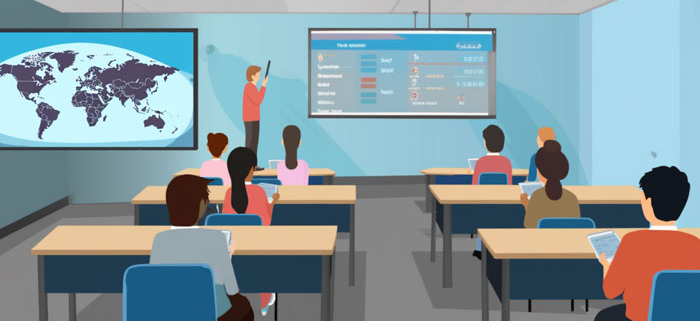The transformative role of captions in educational settings
When it comes to education, inclusivity and accessibility are paramount. As technology continues to revolutionise learning environments, educators are embracing innovative tools to ensure that every student has equal access to educational content. Among these tools, captions have emerged as an incredibly popular and effective solution, revolutionising the way students engage with course materials and fostering a more inclusive learning experience.
Breaking down barriers to learning
For students with hearing impairments, captions provide essential access to auditory content, allowing them to fully participate in classroom discussions and lectures. By providing text-based representations of spoken dialogue, captions break down barriers to learning, ensuring that all students, regardless of their hearing abilities, can access and comprehend course materials effectively.
Supporting diverse learning styles
Beyond facilitating access for students with hearing impairments, captions also support diverse learning styles and preferences. Visual learners, for example, benefit from the reinforcement of auditory content through text, enhancing their comprehension and retention of course material. Similarly, ESL (English as a Second Language) students can utilise captions to improve their language skills by following along with spoken dialogue while simultaneously reading the corresponding text.
Enhancing comprehension and engagement
Captions play a crucial role in enhancing comprehension and engagement among students. Research has shown that captions can improve reading skills, vocabulary acquisition, and overall comprehension of academic content. Additionally, captions can help students stay focused and engaged during lectures, reducing distractions and increasing retention of information.
Embracing technological advancements
With advancements in captioning technology, educators have access to a wide range of tools and resources to integrate captions seamlessly into their teaching practices. Real-time captioning services provide live captioning for in-person and virtual classroom settings, ensuring accessibility in real-time.
Meeting legal and ethical obligations
Beyond the teaching benefits, the use of captions in education also aligns with legal and ethical obligations related to accessibility. Laws such as the Americans with Disabilities Act (ADA) in the United States and the Equality Act in the United Kingdom mandate equal access to educational opportunities for individuals with disabilities, including those with hearing impairments. By incorporating captions into course materials, educators demonstrate their commitment to creating inclusive learning environments that accommodate all students.
Talk to us about captions for education
In conclusion, captions play a transformative role in educational settings, facilitating access, supporting diverse learning styles, enhancing comprehension and engagement, embracing technological advancements, and meeting legal and ethical obligations.
As educators continue to leverage the power of captions to create inclusive learning environments, students of all abilities will benefit from enhanced access to educational opportunities and improved academic outcomes. By embracing captions as a fundamental tool in education, we can ensure that every student has the opportunity to thrive and succeed in the classroom and beyond.
Here at 121 Captions, many in our team are higher education career consultants, working regularly with the Disabled Students Allowance (DSA) assessors to deliver exceptional, high-quality live captioning.
Our speech to text reporter (STTR) can caption word for word at up to 360 words per minute, with only a one second lag time!
This allows students to read the lecture, word by word, at the same speed as their peers hear it, enabling them to answer questions, participate in discussions, and make comments, levelling the playing field for everyone.
All our speech to text reporters are registered and accredited by internationally-recognised professional associations, all of which have high qualification requirements and abide by their professional codes of conduct.
The system is simple yet effective, and with a network of over 300 captioners all over the world, we can provide a captioner at short notice and easily accommodate changes to scheduled teaching.
Contact us today if you would like to know more about live captioning for education.
Our friendly and professional staff will be happy to help in any way they can.




Leave a Reply
Want to join the discussion?Feel free to contribute!